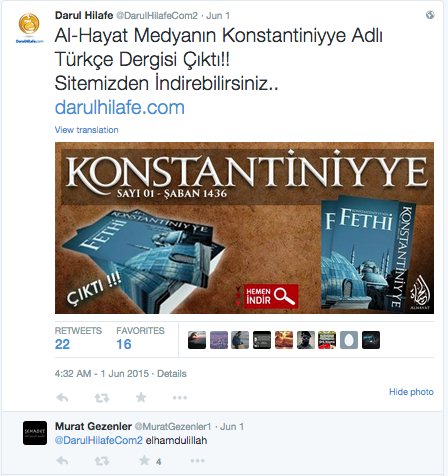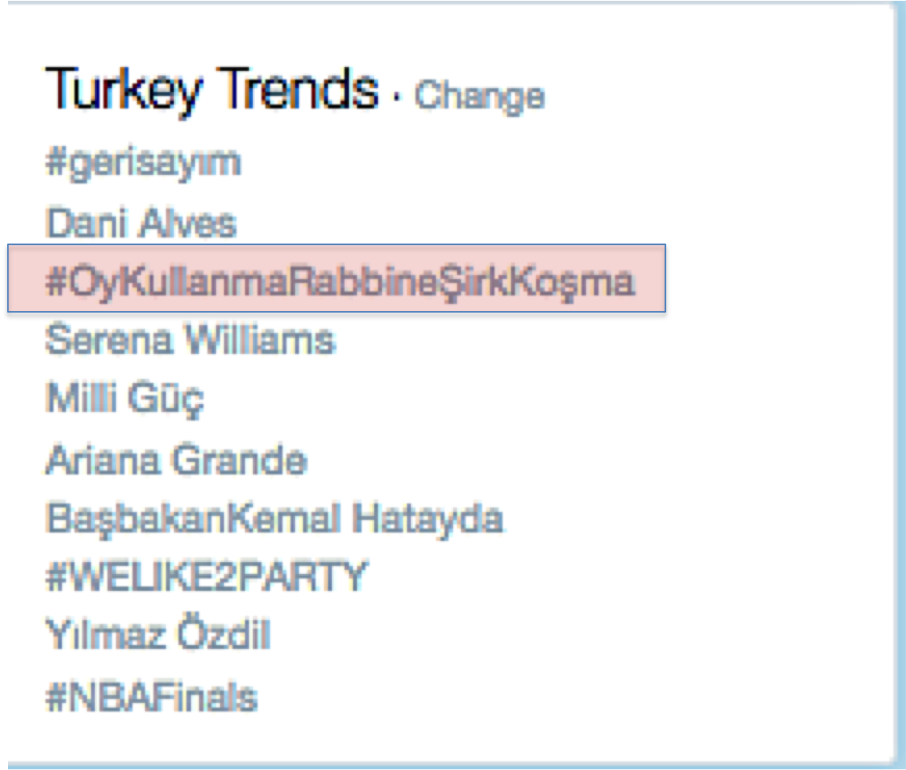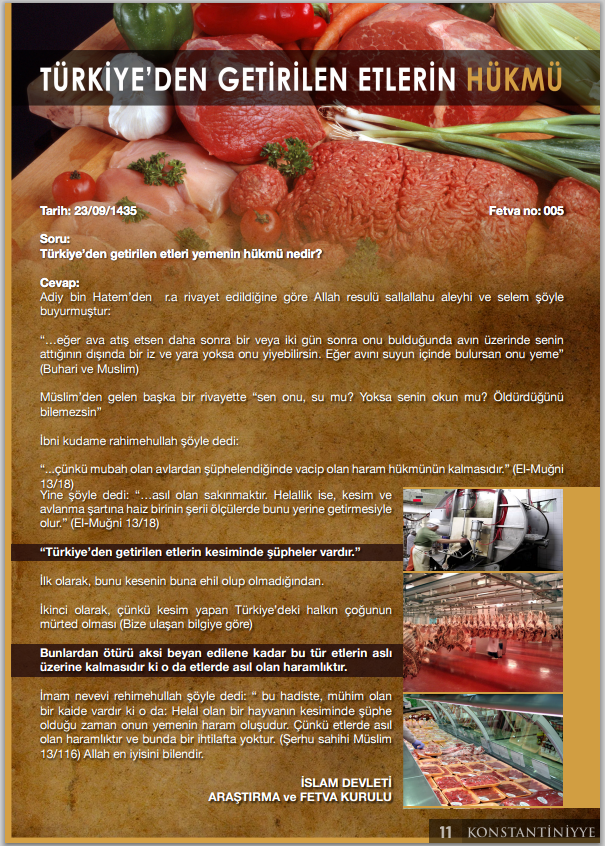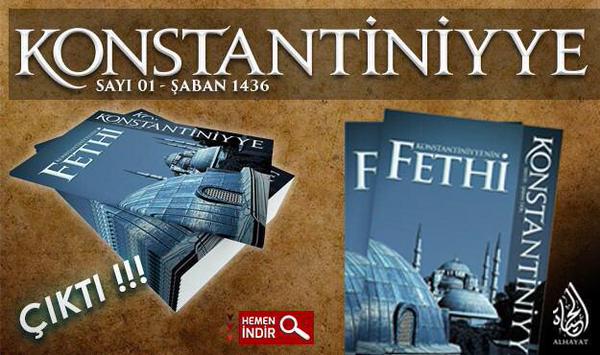For prior magazine issues see: #6, #5, #4, #3, #2, and #1.
—

Click the following link for a safe PDF copy: The Islamic State — “Constantinople Magazine #7″
________________
To inquire about a translation for this magazine issue for a fee email: [email protected]
Search Results for: constantinople
New magazine issue from The Islamic State: “Constantinople #6"
For prior magazine issues see: #5, #4, #3, #2, and #1.
—

Click the following link for a safe PDF copy: The Islamic State — “Constantinople Magazine #6”
_________________
To inquire about a translation for this magazine issue for a fee email: [email protected]
New magazine issue from The Islamic State: “Constantinople #5"
For prior magazine issues see: #4, #3, #2, and #1.
—

Click the following link for a safe PDF copy: The Islamic State — “Constantinople Magazine #5”
____________________
To inquire about a translation for this magazine issue for a fee email: [email protected]
New magazine issue from The Islamic State: “Constantinople #4"
For prior magazine issues see: #3, #2, and #1.
—

Click the following link for a safe PDF copy: The Islamic State — “Constantinople Magazine #4″
___________________
To inquire about a translation for this magazine issue for a fee email: [email protected]
New magazine issue from The Islamic State: “Constantinople #3"
For prior magazine issues see: #2 and #1.
—

Click the following link for a safe PDF copy: The Islamic State — “Constantinople Magazine #3″
______________________
To inquire about a translation for this magazine issue for a fee email: [email protected]
al-Ḥayāt Media Center presents a new magazine issue from The Islamic State: “Constantinople #2"
Click here for the first issue.
—

Click the following link for a safe PDF copy: The Islamic State — “Constantinople Magazine #2″
_________________
To inquire about a translation for this magazine issue for a fee email: [email protected]
GUEST POST: The Conquest of Constantinople: The Islamic State Targets a Turkish Audience
NOTE: As with all guest posts, the opinions expressed below are those of the guest author and they do not necessarily represent the views of this blogs administrator and does not at all represent his employer at the Washington Institute for Near East Policy.
Jihadology.net aims to not only provide primary sources for researchers and occasional analysis of them, but also to allow other young and upcoming students as well as established academics or policy wonks to contribute original analysis on issues related to jihadism. If you would like to contribute a piece, please email your idea/post to azelin [at] jihadology [dot] net.
Click here to see an archive of all guest posts.
—
The Conquest of Constantinople: The Islamic State Targets a Turkish Audience
By North Caucasus Caucus
“We earnestly desire from our exalted god that He grant us the good news of the conquest of Istanbul and other places, and in that vein we patiently continue.” – Konstantiniyye, June 2015, pp.6
Introduction

On 01 June 2015, official Islamic State (IS) media outlet al-Hayat Media released the first issue of a new Turkish language magazine entitled, Konstantiniyye (the transliteration of the Ottoman spelling of Constantinople). The lay out and design of the 46-page magazine are familiar to those who have read some of al-Hayat’s other publications such as Dabiq and Istok, a similar specifically Russian-language magazine just released several weeks prior to Konstantiniyye. While all the previous issues of IS’s magazine, Dabiq, had been translated into Turkish, this is the first official publication from al-Hayat directed at a Turkish audience and could be an indication of IS leadership no longer caring as much about provoking the Turkish government.
Content and Themes Directed at a Turkish Audience
The first issue of Konstantiniyye was entitled, “The Conquest of Constantinople.” In the introduction of the magazine, al-Hayat lays out its goals and bemoans that “the people of Turkey, especially Muslims, have been deprived of much of the multitude of news, writings, and videos coming out of the Islamic State each day.” To rectify this, al-Hayat states that they established a dedicated Turkey desk, which will provide official translations of all al-Hayat publications as well as publish Konstantiniyye monthly. Konstantiniyye specifically for a Turkish audience and focusing on “topics of interest to Muslims in Turkey about the Islamic State.” The writers go on to say, “We have tried not to overwhelm the reader by taking care to keep our writings short.” The release of the magazine appears to have been timed to coincide with two events in Turkey – the annual celebration of the conquest of Constantinople and the Turkish national elections.
Conquest of Istanbul
The centerpiece of the magazine is an article entitled, “The Conquest of Constantinople.” The magazine was released two days after Turkey’s annual celebration of “Fetih Gunu,” the day commemorating the fall of Constantinople to the Ottomans in 1453. The commemoration of this event has grown considerably over the last decade and become a much more prominent event in Turkish popular consciousness. The impressive panorama museum, constructed in 2006, remains a very popular tourist attraction. (I visited myself in 2014 and had to wait in line for more than 45 minutes to enter). A film about the conquest, Fetih 1453 was released in February 2012 and was the most expensive and highest grossing movie in Turkish history. Clips from Fetih 1453 were used in the al-Hayat Balkans-focused release, “Honor in Jihad.”
The article seeks to tie the conquest of Constantinople and modern day Istanbul into IS’s broader narrative about the pre-destined nature of Caliphate and the final apocalyptic battles at al-Amaq and Dabiq. Based primarily on the hadiths of Abu Hurairah, the author writes, “Allah’s messenger [Muhammed]…told us the good news that Constantinople would also be conquered. Constantinople was conquered before, but the conquest referred to in this good news has not yet occurred.” However, the conquest does not refer to taking the city by force. The author writes, “As can be understood from these hadiths, close to the Last Hour, the city that was formerly known as Constantinople and now is known as Istanbul will be conquered with the call of takbir and without weapons or blood.” The discussion of the conquest of Istanbul is likely in line with previous claims that IS will conquer Rome. This is not an actual goal, but more to energize a potential Turkish audience.
Following “The Conquest of Constantinople,” the magazine features a poem about Istanbul (a full translation of the poem can be found at the end of this article). The popularity of poetry among jihadis has been well chronicled among many nationalities of foreign fighters (Thomas Hegghammer has written on this topic extensively, as has The New Yorker). This mirrors the increased volume of original IS-focused nasheeds regularly released throughout the last few months.
Elections and Democracy

There ar e two sections on democracy, one entitled, “Democracy was Ignited ” and the other “The Qur’an is for the Dead and Democracy is for the Living.” Both articles lay out standard Salafi arguments about the incompatibility of being a Muslim and participating in democratic systems, as well as how the democratic systems will ultimately fall just like communism and socialism. As a potential indicator of writers knowing their audience, the first article included a meme popular on more religiously conservative Turkish Facebook pages, featuring US soldiers raiding a house in Iraq with the caption, “Open the door, Democracy is coming!” The title of the second article presents the idea that some Muslims have been deceived into believing that the Qur’an does not apply to them in their everyday life, therefore there is a need for democracy.
While unlikely coordinated, a Turkish Salafi group headed by Halis Bayancuk (Ebu Hanzala), similarly launched an anti-voting campaign. Though often associated with IS in both the Turkish and Western media, Bayancuk publicly stated in May 2015 that he has not pledged allegiance to IS emir Baghdadi, but some IS members call him their brother and he calls some IS members his brothers in religion. Using the slogan, “Don’t vote, honor your creator,” Bayancuk’s websites, Tevhidgundem, Tevhiddersleri, and Tevhiddergisi, laid out the organization’s strategy and goals. Laying out both real world and virtual tactics, goals included distributing hundreds of thousands of brochures and hanging a similar number of billets in 30 major cities around the country as well as sending five million e-mails and hashtag bombing (having supporters all tweeting at 9pm local time in order to get the campaign’s hashtags trending). On 04 June, #OyKullanmaYaratıcınaŞirkKoşma (Don’t vote, don’t undermine your creator) and #OyKullanmaRabbineSirkKosma (Don’t vote, don’t undermine your lord) did briefly trend in Turkey. Under the hashtag, supporters posted photos of themselves posting billets and using graffiti stencils to deface political advertisements throughout the country.
Considering the enviable over 85% turnout for the election, the campaign likely had a negligible effect on the overall outcome of the election. However, it shows a growing coordination and support base for Salafi groups. A similar, but much smaller campaign was launched during the last national election in 2011. One major difference was the attempt to get grass roots support – providing instructions on how people could personally get involved as well as PDFs of the brochures and stickers so supporters could have them produced in one of Turkey’s ubiquitous print shops.
Other Turkey Focused Content and Other Standard IS Propaganda

The final two articles, calibrated to resonate specifically with a Turkish audience, are a dietary fatwa and an article about Palestinians in the Yarmouk camp. The fatwa focuses on how people living in the Islamic State should not eat meat brought in from Turkey (such as pre-packaged meat sold in grocery stores). The primary reason against eating this meat, according to the fatwa, is the animals are not slaughtered in accordance with proper rules and those handling the meat are not actually Muslims. Stories about processed meat in Turkey not being halal have existed for years (though the authors claim they have insider information on the topic). Additionally Palestinian issues have had great resonance among a large portion of the Turkish population, not just Salafis or the very religiously conservative.
The remainder of the magazine is standard IS media material – a translation of an address by IS spokesman Ebu Muhammed al Adnani entitled, “The Killers and Those who are Killed (originally released in March 2015), justification for the destruction of Iraqi antiquities, and a profile of Boko Haram and its pledge of allegiance to IS. The material is generally short and punchy and with the purpose of convincing readers the necessity to immigrate to the Islamic State.
Distribution and Reach
The website, darulhilafe.com appears to have been the first to post the
al-Ḥayāt Media Center presents a new magazine from The Islamic State: "Constantinople #1"

Click the following link for a safe PDF copy: Constantinople Magazine #1
_________________
To inquire about a translation for this magazine issue for a fee email: [email protected]
New statement from Dr. Akram Ḥijāzī: "Goodbye Oh Honorable Shaykh"
UPDATE 5/9 9:32 AM: Here is an English translation of the below statement:

In the name of Allah the Most Gracious, the Most Merciful
“And never think of those who have been killed in the cause of Allah as dead. Rather, they are alive with their Lord, receiving provision, (169) Rejoicing in what Allah has bestowed upon them of His bounty, and they receive good tidings about those [to be martyred] after them who have not yet joined them – that there will be no fear concerning them, nor will they grieve. (170) They receive good tidings of favor from Allah and bounty and [of the fact] that Allah does not allow the reward of believers to be lost – (171) Those [believers] who responded to Allah and the Messenger after injury had struck them. For those who did good among them and feared Allah is a great reward – (172) Those to whom hypocrites said, “Indeed, the people have gathered against you, so fear them.” But it [merely] increased them in faith, and they said, “Sufficient for us is Allah, and [He is] the best Disposer of affairs.” (173)” (Surah Aal Imran 169-173)
When Sultan Muhammad Fatih, conquered Constantinople, he was less than 25 years of age!! And when he passed away almost close to 80 years, the bells of churches rang for three days in Europe in celebration and merriment and craze and belittlement of the one who had disgraced them and was preparing to conquer Rome… a happiness unequal except to their happiness and the Jews and their allies with the passing away of a man who is unique in his time, in manners and simplicity and faith and courage and steadfastness and humanity…
Really! It was not for the people of disbelief and association and vanity to harvest all this happiness and set up parties and dance like dogs on the bodies of lions, except for the fact that Usama caused them that level of vexation and disgrace, what shattered their self respect and broke their might, and influence, and revealed their hidden, and made them a moral for others… until they became, due to sheer happiness and overwhelming with the death of Sheikh Osama, after great vexation, like the cat that relates with pride the deeds of a lion… and what happiness is it if they only knew its effect upon the selves of the sons of the Ummah so that they regret the evil of their doing?
A happiness that was met, except for those who resisted, big and small, general and special, Arabs or non Arabs, male or female, analysts, scholars, Mujahedeen, journalists, supporters, aiders, and even those who differed and condemned… with deep sadness, and great respect and honor, for a knight who fought the tyrants of earth with unrelenting patience and mind, and then dismounted his horse… a knight who gave up to his destiny as Sheikh Tahir Owais
A sadness that has no other meaning except to be a bitter thorn in the throat of Obama and his allies… a thorn that has stripped them of every form of manner and respect except a justice that they have claimed for themselves that is evil and envious, after having denied it to everyone else, justifying every transgression, indiscretion and beastly action in the right of the sons of man… a thorn, that is so overwhelming that it has taken in its indications and vastness and encompassment to strangle every enemy and agent and traitor and immoral or drunkard or doubtful one, in vain, that he has performed a great deed, or that the world without Usama has become safe…
Osama died… no… he did not die… the news is not true… there should be a verifying statement… or… denial… or… decisiveness in the matter… no instead they buried him at sea in the Islamic manner!!… He was shot in the head… was killed in a heavy firefight… a helicopter downed in the attack… but due to mechanical errors… several accounts that can’t be believed by the mind or justified by logic… fabricated pictures… and statements… all of which require investigation
A happening this great has a lot of ambiguity… waiting… doubting… lack of concentration… doubts… belying… believing… waiting… hastening in condolence… like this they swallowed the event… and involved the Ummah in the details rather than dealing with the event itself…. And in this way they scattered the emotions… in order to drain out the initial expressions… taking advantage in that, of the difficulty of immediate reply from Al Qaeda
They worked out, through their aired channels lies and falsehood and fabrications… and they still are… and through those who are riding upon the bones and blood of the sons of man, to spread poison and lies in the minds of the common people… but they harvested nothing except resistance and their language and evil stances were not met by, except with loss… for unique personalities remain great… and great events cannot be hidden, and they cannot be employed at the level of which they remain, in the hearts and minds or both of them
Osama is a thought that brought to life the Aqeedah of the Ummah… and raised the conscience of the people… and united the minds… and prepared to get rid of transgression and tyranny and tyrants and encouraged to aid the weak and oppressed and set up the Sharia of Allah… the thought of an Aqeedah that cannot be assassinated… and is not an organization, a party or an ideology that lives for a portion of time and then wears off like the wearing off of its people… but they thought so and they still think… so glad tidings for the Ummah the time of whose ideological dominance has arrived… and woe for a Ummah the time of whose demise has drawn close
The heroes of the Ummah, from the very beginning of the message, were blooming youth from 25 years to 30 years of age… all that they had was faith… and whatever else they had, they gave it to others… so they left away bodily, like other sons of man, and remained alive as lofty examples, and ideals that time has remained incapable of erasing, like this were several of the companions… and like this was Muhammad Fatih, and like this began the legend of the young Mujahid Usama until he died old in age… and with the likes of these is the Ummah enliven, and its religion renewed, until Allah fulfils a matter that was decreed. So may Allah have mercy on the honorable Sheikh bin Laden, a vast mercy… and may Allah have mercy upon the loyal sons of the Ummah.
Authored by
Dr. Akram Hijazi
Translated by
Dar Al Murabiteen Publications
_____
—

Click the following link for a safe PDF copy: Dr. Akram Ḥijāzī — “Goodbye Oh Honorable Shaykh”
_____
Guest Posts
Jihadology.net aims to not only provide primary sources for researchers and occasional analysis of them, but also to allow other young and upcoming students as well as established academics or policy wonks to contribute original analysis on issues related to Global Jihadism. If you would like to contribute a piece, please email your idea/post to azelin [at] jihadology [dot] net.
Past Guest Posts:
Intel Cocktail, “SoundCloud’s ISIS Problem and How to Fix It,” July 24, 2023.
Kévin Jackson, “al-Zawahiri’s Line of Succession,” June 26, 2023.
Saleh al-Hamawi, “Intellectual Differences Between the Taliban, al-Qaeda, ISIS, and the Hay’at Tahrir al-Sham,” October 27, 2021.
Daveed Gartenstein-Ross and Madeleine Blackman, “Fringe Fluidity: How Prior Extremist Involvement Serves as a Distinct Radicalization Pathway,” February 28, 2019.
Nathan Vest, “Heretics, Pawns, and Traitors: Anti-Madkhali Propaganda on Libyan Salafi-Jihadi Telegram,” February 25, 2019.
Reinier Bergema and Colonel RNLAF (ret.) Peter Wijninga, “Coming Home: Explaining the Variance in Jihadi Foreign Fighter Returnees Across Western Europe,” February 15, 2018.
Abdulbasit Kassim, “‘Who Is a Muslim?’: Mubi Mosque Attack, Masjid ad-Ḍirār, and the Historical Attempt at Defining a Muslim in the 19th, 20th and 21st Century Hausaland and Bornu,” November 21, 2017.
Alexander Schinis, “Hymnal Propaganda: A Closer Look at ‘Clanging of the Swords’,” Octover 16, 2017.
Héni Nsaibia, “Jihadist Groups In The Sahel Region Formalize Merger,” March 27, 2017.
Amarnath Amarasingam, “An Interview with Rachid Kassim, Jihadist Orchestrating Attacks in France,” November 18, 2016.
Amarnath Amarasingam, “Searching for the Shadowy Canadian Leader of ISIS in Bangladesh,” August 2, 2016.
Aymenn al-Tamimi, “The Fitna in Deraa and the Islamic State Angle,” March 26, 2016.
Christopher Anzalone, “From al-Shabab to the Islamic State: The Bay‘a of ‘Abd al-Qadir Mu’min and Its Implications,” October 29, 2015.
Cori E. Dauber and Mark Robinson, “ISIS and the Hollywood Visual Style,” July 6, 2015.
Dur-e-Aden, “TTP Says That Baghdadi’s Caliphate Is Not Islamic—But Is Anyone Listening?,” June 29, 2015.
North Caucasus Caucus, “The Conquest of Constantinople: The Islamic State Targets a Turkish Audience,” June 9, 2015.
Sam Heller, “Ahrar al-Sham Spiritual Leader: The Idol of Democracy Has Shattered,” June 3, 2015.
Asher Berman, “The Syria Twitter Financiers Post-Sanctions,” May 18, 2015.
Sam Heller, “Abdullah al-Muheisini Weighs in on Killing of Alawite Women and Children,” May 12, 2015.
Maxwell Martin, “A Strong Ahrar al-Sham Is A Strong Nusra Front,” April 7, 2015.
Aimen Dean, “The End of al-Qaeda,” April 4, 2015.
Amarnath Amarasingam and Aymenn Jawad Al-Tamimi, “Is ISIS Islamic, and Other “Foolish” Debates,” April 3, 2015.
Charlie Winter, “Women of The Islamic State: Beyond the Rumor Mill,” March 31, 2015.
Anne Stenersen and Philipp Holtmann, “The Three Functions of UBL’s “Greater Pledge” to Mullah Omar (2001-2006-2014): Attract Jihadi Volunteers, Legitimize the Taliban as Guardians of the Caliphate and Denounce IS-leader al-Baghdadi,” January 8, 2015.
Sam Heller, “Muhammad al-Amin on Ahrar al-Sham’s Evolving Relationship with Jabhat al-Nusrah and Global Jihadism,” December 9, 2014.
Philipp Holtmann, “The Different Functions of IS Online and Offline Plegdes (bay’at): Creating A Multifaceted Nexus of Authority,” November 15, 2014.
Sam Heller, “Recriminations on Social Media Shed Light on Jabhat al-Nusrah’s Inner Workings,” November 4, 2014.
Sam Heller, “Jeish al-Muhajireen wal-Ansar Shar’is Debate Islamic Rule Inside and Outside the ‘Islamic State’,” October 25, 2014.
Goha’s Nail, “Manbij and The Islamic State’s Public Administration,” August 27, 2014.
Daveed Gartenstein-Ross and Oren Adaki, “Ansar al-Sharia in Tunisia’s Social Media Activity in 2014,” June 6, 2014.
Zach Goldberg, “Damned if They Do, Damned if They Don’t: The Gordian Knot of Europe’s Jihadi Homecoming,” April 22, 2014.
Daveed Gartenstein-Ross, “Ayman al-Zawahiri on Jihadist Infighting and the Islamic State of Iraq and al-Sham,” April 21, 2014.
Joel D. Parker, “Ahrar al-Sham versus Ahrar al-Sham: The band and the militia,” January 29, 2014.
Daveed Gartenstein-Ross, “Abdulhakim Mujahid Muhammad (Carlos Bledsoe): A Case Study in Lone Wolf Terrorism,” December 23, 2013.
Hazim Fouad, “Salafi-Jihadists and non-jihadist Salafists in Egypt – A case study about politics and methodology (manhaj),” April 30, 2013.
Daveed Gartenstein-Ross and Tara Vassefi, “Perceptions of the “Arab Spring” Within the Salafi-Jihadi Movement,” November 19, 2012.
Jack Roche, “The Indonesian Jamā’ah Islāmiyyah’s Constitution (PUPJI),” November 14, 2012.
Kévin Jackson, “The Pledge of Allegiance and its Implications,” July 27, 2012.
Behnam Said, “A Brief Look at the History and Power of Anasheed in Jihadist Culture,” May 31, 2012.
Jonah Ondieki and Jake Zenn, “Gaidi Mtaani,” April 24, 2012.
Joshua Foust, “Jihadi Ideology Is Not As Important As We Think,” January 25, 2011.
Charles Cameron, “Hitting the Blind-Spot- A Review of Jean-Pierre Filiu’s “Apocalypse in Islam”,” January 24, 2011.
Daveed Gartenstein-Ross, “Why Jihadi Ideology Matters,” January 21, 2011.
Joshua Foust, “Some Inchoate Thoughts on Ideology,” January 19, 2011.
Marissa Allison, “Militants Seize Mecca: Juhaymān al ‘Utaybī and the Siege of the Grand Mosque in Mecca,” June 9, 2010.
